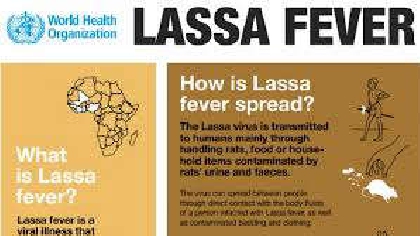
The Nigeria Centre for Disease Control (NCDC) in seven days, don confirm 13 additional new cases of Lassa fever from five states, wey be; Ondo, Edo, Kogi, Ebonyi and Imo.
The NCDC inside eim disease report tell News Agency of Nigeria(NAN) on Monday, say, since the beginning of 2022, 70 per cent of infections don come from three states: Ondo (31 per cent), Edo (26 per cent), and Bauchi (13 per cent).
NAN reports say Lassa fever na acute viral haemorrhagic illness wey Lassa virus cos. People dey catch the Lassa virus if dem expose food or household items contaminated with urine or faeces of infected rats – present in several West African countries where the disease is endemic.
The virus fit spread through infected bodily fluids.
The public health agency tok say the country don record 165 deaths inside 17 states.
The agency tok say,” Inside one week 31 (Aug. 1 to 7), the number of new confirmed cases don increase from 10 in week 30, 2022 to 13 cases. These were reported from Ondo, Edo, Kogi, Ebonyi and Imo states.
“From week 1 to week 31, 2022, 165 deaths naim dey report with a case fatality rate (CFR) of 18.8 per cent wey dey lower than the CFR for the same period in 2021 (23.1 per cent).
“In total for 2022, 25 States don record at least one confirm case across 100 Local Government Areas.
“Of all the confirm cases, 70 per cent na from Ondo (31 per cent), Edo (26 per cent), and Bauchi (13 per cent) States,”.
The NCDC tok say the main age group affected were 21-30 years (Range. zero to 90 years, Median Age: 30 years.
It said that the male-to-female ratio for confirmed cases was 1:0.8.
“The number of case wey dem suspect don increase compare to wetin dem report for the same period inside 2021.
“No new Healthcare worker dey affected inside the reporting week 31,”.
The NCDC, tok say the National Lassa fever multi-partner, multi-sectoral Technical Working Group (TWG) don continue to handle the response activities inside all levels.
Meanwhile, the agency no tok say any new Healthcare workers don dey affected in reporting week 31.
Lassa fever na virus wey dey first see for Nigeria when two missionary nurses sick with the virus for 1969. Dem get the name from the village of Lassa, where dey first see am.
Lassa fever na viral infection carried by the multimammate rat Mastomys natalensis (M. natalensis).
This na one of the most common rodents inside equatorial Africa, e dey across much of sub-Saharan Africa.
Lassa fever dey for Sierra Leone, Liberia, Guinea, and Nigeria. However, the Mastomys rat dey common inside neighbouring countries, so des areas also dey at risk.
Once a Mastomys rat dey infected with the virus, e fit shit trusted sources of the virus in its faeces and urine, potentially for the rest of its life.
As a result, the virus fit spread easily, especially as the rats dey breed fast fast and fit live inside house.
The most common method of transmission is by consuming or inhaling rat urine or faeces. It can also be spread through cuts and open sores.
The rats dey live wey human being dey stay and the rats dey touch foodstuffs. Sometimes people dey chop the rats, and the disease fit spread during dia preparation.
Person-to-person contact dey possible via blood, tissue, secretions or excretions, but no be through touch. Sharing needles fit spread the virus, and there are some reports of sexual transmission.
Lassa fever fit pass between patients and staff for poorly equipped hospitals where sterilisation and protective clothing no dey
Meanwhile, one new vaccine don promise to fight the Lassa virus.
Researchers at the University of Texas Medical Branch don achieve success with a new vaccine wey go fight Lassa Virus.
Na up to 500,000 people naim dey infected each year in West Africa.
Up to one-third of pipu wey get Lassa Fever dey suffer hearing problem or neurological complications.
The study, “A recombinant VSV-vectored vaccine rapidly protects nonhuman primates against heterologous lethal Lassa fever,” dey publish July 19 in Cell Reports. (NAN)


